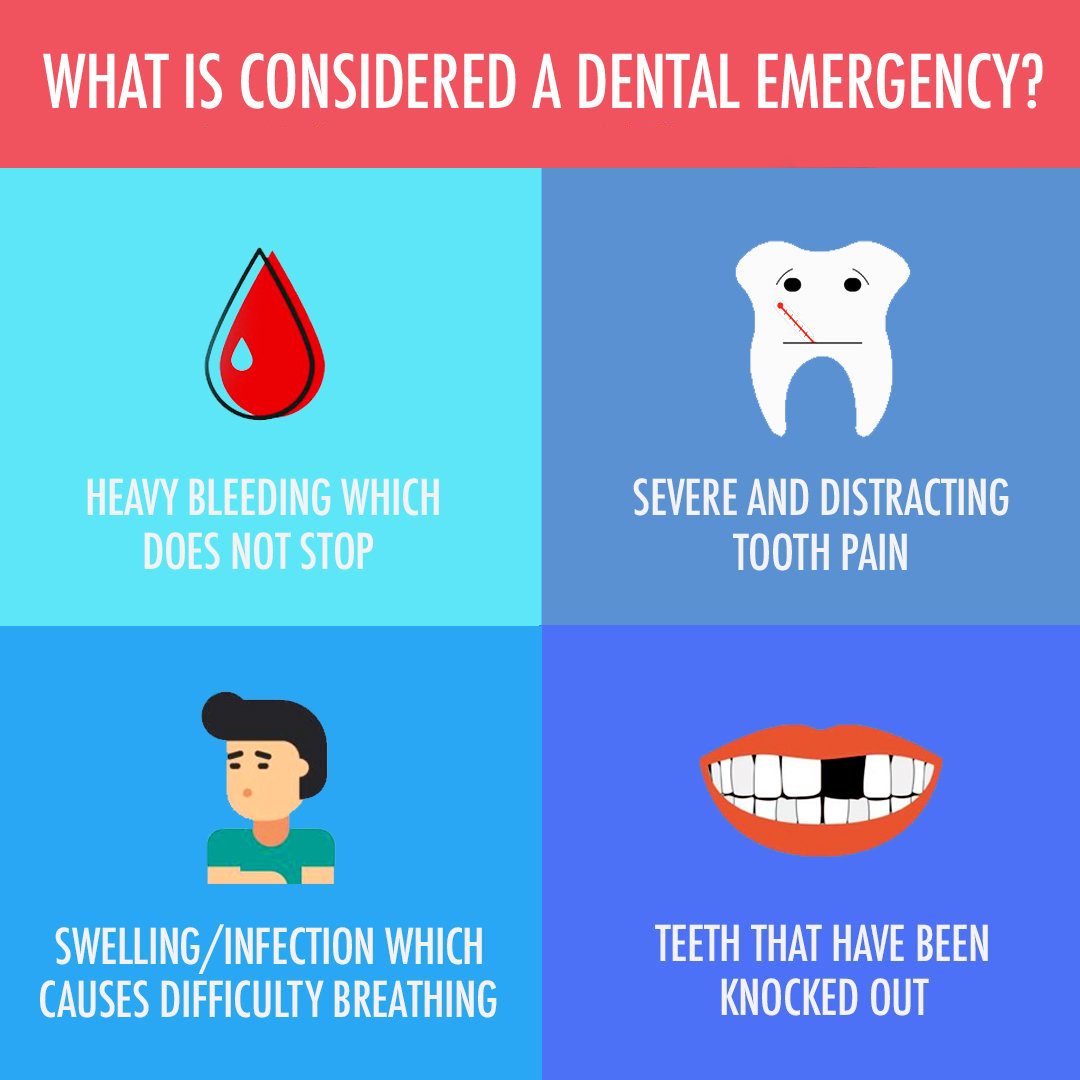With the mandatory closure of non-essential businesses, we just wanted to reassure you that Dentists MUST still available to treat dental emergencies as needed. Far too often patients do not understand what a true dental emergency even is. Use these tips and graphic to help educate, give comfort and give the best care to your patients.
1. Severe Tooth Pain
Throbbing tooth pain is indeed a sign that you might have tooth damage. Tooth decay or a cavity can give you a toothache. Throbbing tooth pain can also happen if there is an infection in the tooth or in the gums surrounding it. Toothaches are typically caused by an infection or inflammation in the tooth. This is called pulpitis.
The soft pink pulp inside your tooth helps to keep it healthy and alive. Tooth pulp contains tissue, nerves, and blood vessels. A cavity or crack in the tooth lets air and germs inside the tooth. This can irritate and infect the sensitive pulp nerves, leading to tooth pain. This is commonly treatment by prescribing antibiotics, which can be done over the phone, or during a Teledentistry consult.
2. Heavy Bleeding Which Does Not Stop
Typically, oral surgery requires some amount of cutting into the gum tissue. This means, that even with the gentlest of dentists, patients will experience some bleeding. Often, the bleeding is controlled while still in the dentist office or surgical suite but many patients find that they must deal with a certain amount of bleeding throughout the first 24 hours as well. Although most of the time, a patient can get their own bleeding to stop fairly easily with damp gauze and pressure or with a black tea bag, others may deal with some prolonged or excessive bleeding. These can be caused by:
- Bleeding disorders – Some patients have blood disorders such as Hemophilia which cause excessive bleeding. If a patient has a blood disorder, the post-surgical bleeding will take longer to stop and the surgical site will take longer to heal. Please notify your dentist prior to surgery if you have a known bleeding disorder.
- Past incidents of excessive bleeding – Prior to periodontal surgery, dental implants or wisdom tooth removal, we encourage our patients to think back on other times that that they may have had a tooth extracted or dealt with an oral trauma, a cut, or even a piercing. Did it take a long time to stop the bleeding? These past experiences may be an indicator to whether or not you will be dealing with prolonged or excessive bleeding after oral surgery.
- Medication – There are a number of medications that increase the risk of excessive bleeding. Some are very typical over the counter drugs such as Asprin and Ibuprofen. Others may be prescription drugs such as Warfarin, Plavix, Coumadin, Elaquis, or a number of other commonly prescribed blood thinners.
- Vitamins and Herbs – Some common vitamins and herbs such as Vitamin E or Ginkgo biloba can also significantly affect the bodies ability to form a blood clot.
3. Swelling Or Infections Which Restricts Breathing
Most oral dental emergencies relate to pain, bleeding, or orofacial trauma and should be examined right away dental practitioner. Any swelling of the gums or mouth, face, throat area, does not begin to fade away after 24 hours is extremely serious. To get rid of infection after having one or more teeth extracted, it is necessary to see a dentist so that they can prescribe antibiotics.
If you cannot appear in the office, ask your dentists about their Teledentistry solution as this emergency can be easily diagnosed over a video consult.
4. Teeth That Have Been Knocked Out
"Knocking out a tooth IS a medical emergency. If an adult tooth is knocked out, try putting it back in place and go straight to a dentist. Don't try to re-insert a baby tooth – take your child and contact your dentist immediately."
If you knock out an adult a tooth, you should:
- Find the tooth!
- Hold it by the crown (the white bit that sticks out of the gum) not the roots.
- Clean the the tooth if it's dirty. If you are in public, your own saliva or tongue will work.
- Put it back into position (adult teeth only); never try to re-insert a baby tooth.
- Bite on a handkerchief, paper towel or similar material to hold the tooth in place.
- Contact your dentist via phone or their Teledentistry solution.
If you can't put the tooth back it's original position, put it in milk and see a dentist straight away. The faster a knocked-out tooth is re-implanted, the more likely it is to embed itself back into the gum.
If your child knocks out a baby tooth, you shouldn't try to re-implant it because you may damage the adult tooth growing underneath. Contact your dentist immediately via phone or their Teledentistry solution.


